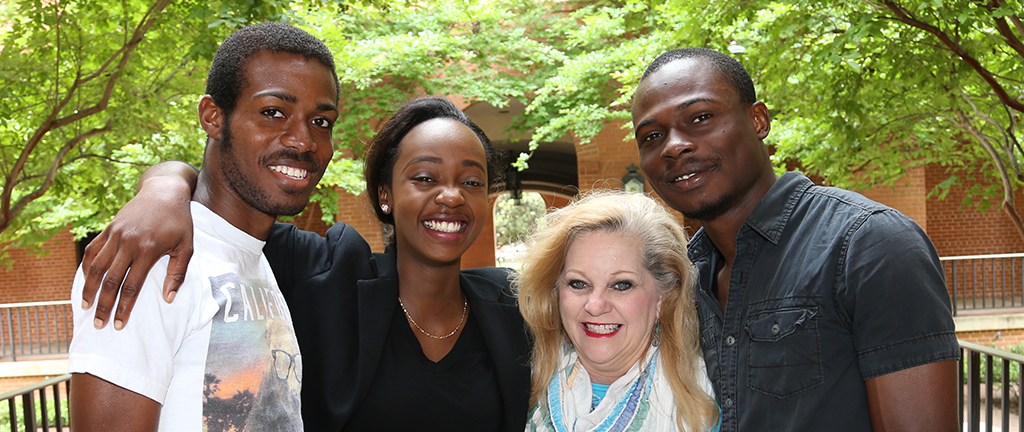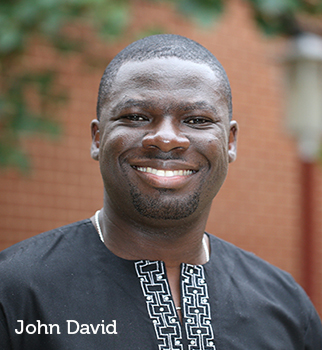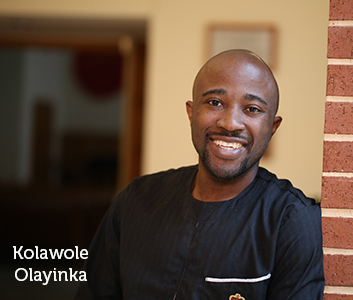Coming to America
Despite alarming headlines and an ever-shifting political landscape back home, Baylor's Nigerian students are navigating college life and American culture with grace.

New Baylor students typically bring a couple of suitcases stuffed with clothes, a few framed photos and maybe some tiny, apartment-sized furniture. Perhaps the most precious things they bring, though, are the hopes and expectations for their years here, and for the future beyond graduation. Having chosen to attend a university some 7,000 miles from home, Baylor's Nigerian students are no exception. They select Baylor for its academic reputation, rich traditions and commitment to Christian mission.
Baylor's Nigerian students--having come from sub-Saharan Africa--also usually appreciate Central Texas' warm climate. Such was the case for sophomore mechanical engineering major Oriade Ayemo, who hails from southwestern Nigeria’s Ondo State, known as the Sunshine State.
"The Texas region appealed to me more than Boston or Chicago, where it snows," Ayemo says. "And the man who came to our school to talk about Baylor--Anis--was a really good speaker. He convinced me about Baylor."
Most of Baylor's Nigerian undergraduate students come to the campus via the U.S. Pathway Program (USPP), first attending a rigorous year at Kaplan International College in Lagos. It was there that Anis Qourzal, associate director of international relations and recruitment at Baylor, introduced them to a place called Waco, Texas.
"His presentation was perfect," Ayemo says. "He also spoke about different events and traditions at Baylor, like Homecoming, that all sounded really nice."
The year at Kaplan International College is followed by a Summer Bridge program at Northeastern University in Boston, after which time, students begin their degree programs as second-year students at Baylor or another of six institutions belonging to the Consortium of North American Universities (CNAU).
"Nigeria is among the top 10 student-sending nations to Baylor University, and our No. 1 student-sending nation in Africa," Qourzal says. "The students that come to us from Nigeria tend to be well prepared academically, coming from rigorous national curricula. Apart from the cultural diversity Nigerian students bring to our student population, their very presence in our classrooms broadens the cultural horizons of our domestic students."
Baylor International Student Relations Manager Melanie Smith agrees that Baylor's non-international students benefit from the cultural diversity and sensitivity international students add.
"Much of what is learned in U.S. colleges is outside the classroom," Smith says. "When it involves an international student, a U.S. student can learn about other cultures outside the U.S. that need to be understood and hopefully explored in his or her lifetime."
Some might question whether international students "take a spot" from a U.S. high school graduate who is interested in Baylor. However, Smith says there are a certain number of "spots" allotted for international students, independent of the incoming freshman class.
"International students, freshmen and transfers are always looked at equally," Smith says. "As part of Pro Futuris, Baylor's goal is to bring the world to Baylor through international students--currently from 73 countries--and to enhance our study abroad program by sending students out into the world for academic experiences."
The Hankamer School of Business attracted Simon Owonaro, a sophomore accounting major from Bayelsa state, located in the heart of the country's Niger Delta region. "Accounting is something I'm good at. And accounting is the language of business," he says. "The five-year accounting program meant I would earn a master's degree as well. And the business school is very connected to companies like ExxonMobil and Conoco Phillips, and [there are a number of] internships available to help students understand what the real world is all about. It's a very good business school."
After graduation, Owonaro intends to work in the U.S. for several years before starting an agriculture-based business in Nigeria. Agriculture represents a significant slice of the Nigerian economy and the source of roughly 70 percent of all jobs, according to an African Economic Research Consortium study.
"Baylor's ranking was awesome in different categories," sophomore pre-nursing studies major Torubein Donyegha says. She grew up mostly in Delta state, just north of Bayelsa. She would have studied microbiology had she stayed in Nigeria, as nursing programs are few and admission is extremely competitive. She hopes to work as a nurse in the U.S. for a few years post-graduation. Her ultimate goal is to launch a nursing home in Nigeria, as a step toward a solution for the country’s insufficient care for the elderly.
"Baylor was well-known out of all the schools available to us," Donyegha says. "It is also a Christian university, and I am a Christian."
According to a 2012 Central Intelligence Agency study, Nigeria's life expectancy (52.62 years) ranks 183rd worldwide out of 195 sovereign states. At this moment in time, she feels called to start the health-related business; however, Donyegha knows that so much regarding health care in Nigeria depends upon the political climate.
In March, Nigeria elected its newest president, Muhammadu Buhari, a Muslim and former military dictator who has promised to address rampant government corruption and a mismanaged economy. Nigerians and onlookers around the world will have a keen eye on his efforts to dismantle and eliminate the Muslim militant group Boko Haram.
Boko Haram aims to impose strict Sharia law across the whole of Nigeria--a country divided nearly equally among Muslims living predominately in the north, and Christians concentrated in the south. Since launching a violent campaign in 2009, Boko Haram--usually translated "Western education is forbidden"--is responsible for bombing schools, government buildings, churches and mosques; assassinating politicians, ministers and clerics; and kidnapping women and children--most notably the April 14, 2014, abduction of 276 teenage girls from a boarding school in the town of Chibok, Borno state, located in northeastern Nigeria. The kidnapping sparked international outrage and inspired the "bring back our girls" social media campaign. At the anniversary of the abduction, an estimated 219 remain missing.
Thus far, attacks by Boko Haram have occurred mainly in northeast, north-central and central Nigeria; but the majority of Baylor's Nigerian students hail from the southern part of the country.
"If you're from the south, it's a totally different ballgame," says John David, a George W. Truett Theological Seminary student and native of Kaduna state, located in north-central Nigeria. Boko Haram does not operate there at this time. "So, [those from the south] haven't experienced the attacks that make the news."
David served as a pastor for nine years in his home state and later in the city of Jos, Plateau state, 135 miles southeast of Kaduna. In January 2013, he arrived at Baylor--accompanied by his wife and two daughters, ages 2 and 6--to pursue a dual master's degree in divinity and social work. David has lived and worked perilously close to the violence, particularly while pastoring in Jos. Fortunately, his family and his congregation back home have been spared thus far.
"When Boko Haram began attacking churches, we had to tell women in the congregation not to come to church with bags because of the fear--because we're not sure who is coming in with a bomb," David explains. "Churches had to establish security committees. With car bombings, there were two strategies: some churches started building barricades so that even if a car was approaching it wouldn't reach the building. Secondly, congregants were asked to park their cars far from the church, so you would know that any car approaching the church is most likely a bomb."
More than once, David visited a blast site days following an attack, including the Church of Christ in Nigeria (COCIN) headquarters in Jos after a suicide bomber drove a vehicle loaded with explosives toward the multi-story compound.
He struggles to provide a description to adequately relay the horror of such a situation.
"I have gone to the site of a suicide bombing, and you will literally see parts of the human body hanging from walls," David says. "In the car, the only part you'll see left after the blast is just the engine compartment. Every other part is spread everywhere, and you can't tell which part is which. The intensity of those blasts is such that if [a bomb detonated] near Baylor, for instance, you would be able to feel the vibration from the blast as far away as H-E-B at Valley Mills [3 miles from campus]. You would hear the sound as far away as Richland Mall [7 miles from campus]. It's something that's hard to talk about. It's just so sad. So sad."
More than 13,000 have died because of the insurgency and an estimated 1 million people have been displaced. While Boko Haram’s reach remains geographically limited thus far, the grief for such a loss of life is not exclusive to the country’s northerners; it is palpable for all Nigerians.
"People from the south or the southern states also mourn for those who have been affected," Ayemo says. "Many in the south have rallied, pleading with the Nigerian government and neighboring nations to help bring back our girls, and help address terrorism in Nigeria. We all care about our sisters kidnapped by Boko Haram and also the loss of life and property destroyed in the north."
As the sense of concern for national security back home is shared, so too are many of the ways in which Baylor's Nigerian students are adjusting to American culture and the American college classroom--where Baylor's small class sizes, increased student-professor interaction and discussion-based learning take some getting used to.
"In Nigeria, the way it works is you just sit down and listen," says Akin Aladipo, a second-year MBA student, attending the Hankamer School of Business on a full scholarship. He earned his undergraduate degree from the University of Lagos and ran a business of his own in Nigeria before coming to the U.S. to pursue an advanced degree. "The lecturer comes in, basically reads from a textbook or his notes and you just take notes for two to three hours. That's the way it works. You never have to say anything in class or participate in any way. So, that was very different about coming here. It was really, really challenging at first."
Christian higher education also holds broad appeal for these students as well as their parents back home. Some parents still harbored concerns about their children attending university in the U.S., thanks in large part to celebrity culture and the tabloids that venerate it.
"My mom was like, 'Don't go! Be sure to take your Bible, and I will pray with you every day,'" says sophomore international studies major Adetutu Adeyeni, known by friends as Tutu or Sophie. "We have a very distinct view of Americans back home in Nigeria. My mom thought going to America was like going to Sodom or Gomorrah. There's a perception that Americans are immoral, like the stars who get married and get divorced in like a week. That's ridiculous. Once I began to change my own thinking, I tried to change my mom's, too. The truth is, back home in Nigeria, I wasn't really serious about God, and now I am. My mom was very surprised by that."
Adeyeni and several of her ex-pat cohort attend Western Heights Baptist Church on Sundays. She and Ayemo sing in the church choir.
"Prayer and worship here are so different," Adeyeni says. "Back home, we pray so aggressively. When we pray, there are 'amens' throughout the prayer--like each time the speaker pauses, everyone says 'amen' and it's really loud. Here, everyone prays so quietly."
She was also surprised by the stillness of Baptist worship--namely the absence of dancing.
"I called my mom back home and told her, 'Nobody dances in church,' and she laughed," Adeyeni says. "Back home we dance so much in worship. We're pouring out in the aisles, dancing."
With a naturally effusive personality, Adeyeni is as social as any of her American classmates and amassed an impressive circle of friends within a short amount of time. Her struggle with any communication barrier was brief, although others within her cohort report continued difficulty.
"Accent is an issue, too," Ayemo explains. "Not only my accent, but I have had trouble understanding an American accent, too. I hate having to repeat myself over and over again. It becomes so frustrating just to have a conversation with someone."
Owonaro says he tries to speak slowly. "I have lots of friends--white, Latin, black," he says. "I don’t expect to be friends with everybody. Friendship is either going to happen or it’s not."
While Nigerian students are educated in English back home, sometimes it feels as though they are speaking an entirely different language here in the U.S. Context, idiomatic speech and vastly different non-verbal cues can turn an otherwise simple exchange into a frustrating test of patience.
"I had to go to Subway (Sandwiches) the other day, and I decided to go on my own," Aladipo says. "And the person behind the counter asked me, 'What kind of bread? But, I only know one kind of bread. I asked him, 'What are the options?' And he just sort of tapped the glass case with the bread inside, like, 'you can read for yourself.' It was kind of rude. After I said 'wheat bread', he just stared at me as if to say, 'go ahead and say something.' So I just started pointing at the things I wanted on the bread. It wasn't a good experience. The thing about Texas though is that most people are very helpful and friendly. Generally, they're very open and warm."
One particularly jarring difference: American students are much more direct in their interactions, whereas Nigerians tend to exercise more caution in delivering their thoughts and opinions.
"Americans really know how to express themselves," Donyegha says. "They are very forward. If you're wearing a dress, an American person may say, 'I don't like that dress.' In Nigeria, if you're trying to say something like that you take it slowly, and sort of weave around it."
With regard to inevitable homesickness, some are missing their families more than others; but thanks to the Internet, parents and siblings are typically only a matter of clicks and taps away.
"I Skype with my parents every Saturday," Donyegha says. "But my mom is on Facebook, she's on WhatsApp and Instagram. She's on my BBM (BlackBerry Messenger). She's everywhere."
Aladipo's parents aren't necessarily happy about the great distance, but they see it as a sacrifice for the ultimate good. He says, "They know they’re going to see me again soon. And I Skype with them almost every day, but Wi-Fi availability in Nigeria is still spotty."
Of four children, Aladipo is the first-born male child, which carries with it a certain burden.
"Everyone's eyes are on you. My younger brother is trying to get into college back home--he's trying to do the same thing I have done," Aladipo notes. "It will be easier for him because I will have already walked down this same path."
Owonaro says he misses the food, a sentiment expressed by the other Nigerian students, as well. "But I don't really miss home," he says. "It's fun being here. I'm an adult. I need to get out of the house. I've been with my family for 20 years. It's time to be on my own."
Kolawole Olayinka, a Master of Business Administration candidate from Nigeria, says pursuing God has been a lifelong experience filled with joy. That journey, and his journey to Baylor, began with Christian parents.
"I have always dreamed of studying abroad, but I was looking for a school guided by sound Christian values with a focus on excellence," Olayinka says. "In the world today, where Christian faith has faded in its importance, Baylor University provides a good environment for me to integrate my Christian faith into my business pursuits and career goals."
Olayinka says joining the Baylor family and making new friends has blessed his life, calling it a treasure.
"All these experiences attest to God's grace in my life, and I can take no credit but only feel deep gratitude for the gift of faith," Olayinka says. "Looking into the future, I am poised to be an agent for change by leading others with integrity, humility, credibility and fairness through moral and ethical decisions that Baylor has instilled in me."

